
- Details
- Written by Mateusz Robakowski
- Category: Minature collecting
- Hits: 1227
Though still mostly a niche hobby, in recent years the past time of collecting Minifigures has grown much in popularity. Mostly connected to popular wargames, like Warhammer 40K or Warhammer: Age of Sigmar, these miniatures attract not only the tabletop strategists but also collectors and even artists.
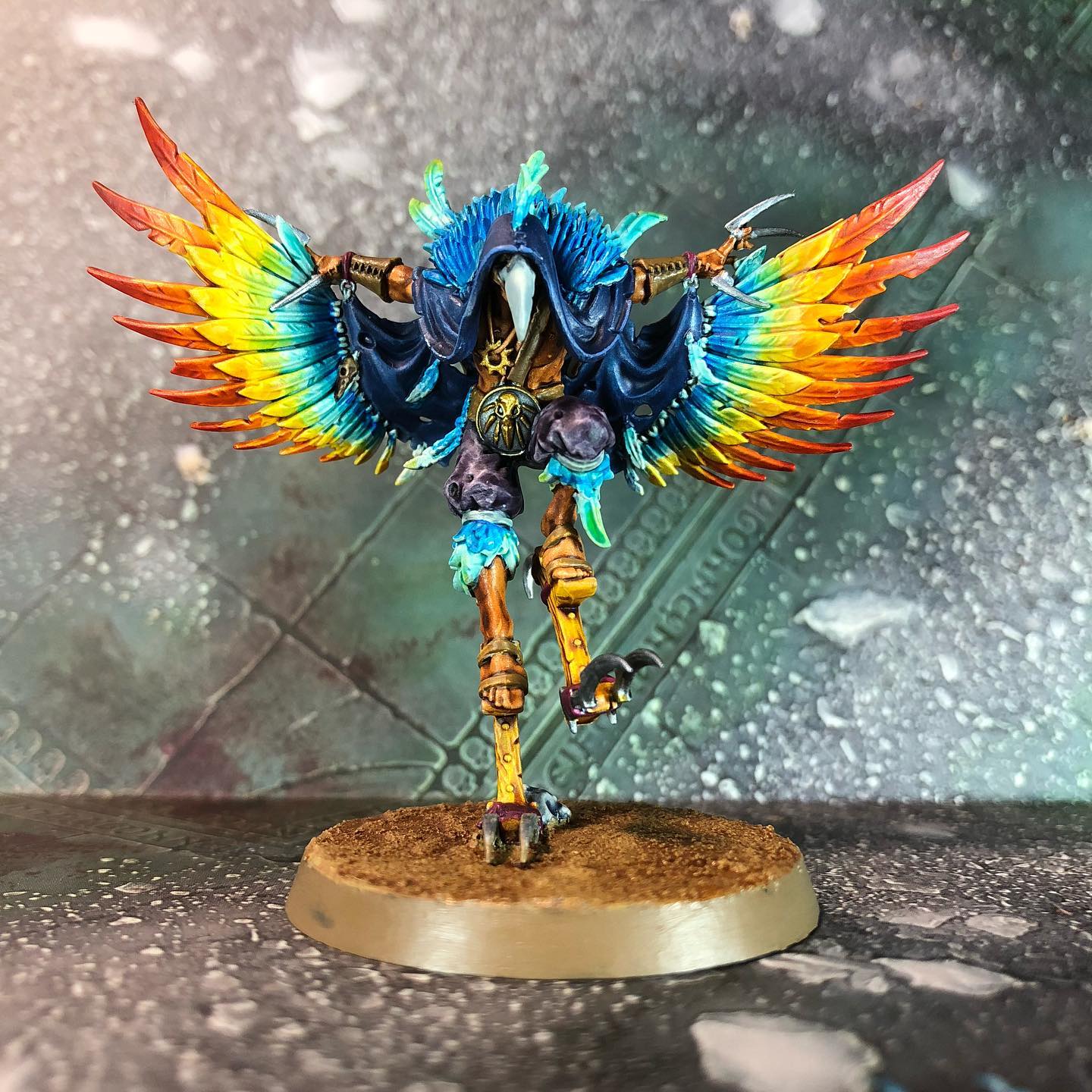
The origins of this hobby can be traced to both Toy Soldiers that children used to play with, and full-on battle reconstructions in diorama form (like on the picture below) that used to be popular amongst amateur and even professional historians of warfare. But the true wargaming was in fact invented by Prussians in the 19th ct. The Prussian military adopted this form of past time as an official tactical training in 1824. In the later part of the century, it moved all around the world to become a hobby for some of the upper classes but only in the second half of the 20th ct, it has become a hobby for everyone. And popularity is only rising!
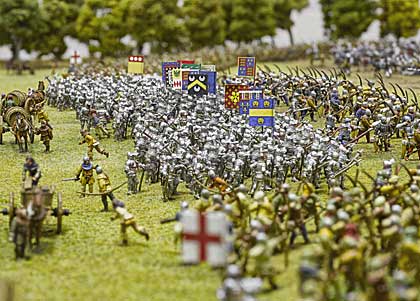
The growing popularity of the hobby can be best presented in a simple fact: Games Workshop, a British wargaming company, perhaps the biggest producer of Minifigures, has risen 160% in stock value in 2017, reaching a whopping £770m. But Games Workshop is far from the only Minifigures producer and all the types of the Warhammers are far from the only kinds of wargames. Below are some interesting examples of wargaming systems that you might want to explore:
- Warhammer 40K and Warhammer: Age of Sigmar by Games Workshop
- Fallout: Wasteland Warfare by Modiphius Entertainment
- Middle Earth by Games Workshop
- Star Wars: X-Wing 2nd Edition by Fantasy Flight Games
- Bolt Action by Osprey Publishing
Assuming that you checked the systems that I recommended (maybe even found some on your own!) what should you do next? Well, it’s simple really! Go out there and buy your first model! (You might need to look for it online since the stores aren’t everywhere). Then you should buy yourselves some glue, a brush and a decent selection of paints. You might pay through your nose, but boy! are you in store for some serious fun!
- Details
- Written by Patrycja Jadczak
- Category: Obesity
- Hits: 2816
Being heavy is not easy. It is not just one big doughnut party after another. There are so many reasons why people are overweight, and many of those reasons include illnesses and bad circumstances.
A terrible injury, illness, or trauma can make a person pack on the pounds. And even though those who are heavy understand their situations, they too often come to adopt society’s contempt for fat. In short, so many people who struggle with their weight begin to hate themselves. Instead of seeing their beauty, they focus on how a shallow society views them. Then they incorporate that hateful view into their self image.
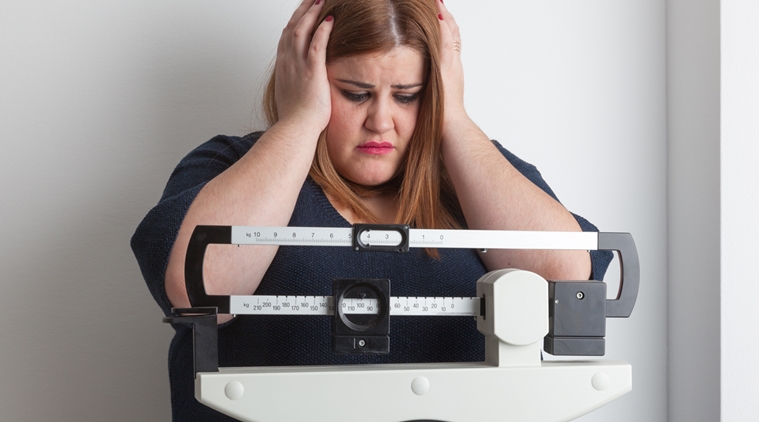
This should never happen, of course, because we all have things about our appearances that we wish we could change. Yet, time and time again, heavy people can become self loathing and angry at themselves. Inside their heads, this little voice says ‘you aren’t good enough.’ When truth is told, these are some of the most beautiful individuals you will come across. There is nothing wrong with them. People come in all shapes and sizes, and beauty transcends our outward appearances.
It is striking that in today’s society, being mean to fat people is almost applauded. You see fat jokes on almost every network, which tells people it is OK to berate those who are heavy. Almost everywhere you look, you see skinny as the ideal, and woe to those who don’t fit that ‘ideal.’
Fat people take notice of the subtle and not so subtle jabs against them. And when you are constantly told you are not good enough, that you are wrong, many times you start to believe it. Those who have dealt with weight their entire lives know how they are viewed and will often make fat jokes about themselves in order to keep others from hurting them with the same cutting words.
Basically, they ‘cut’ themselves before they can be jabbed by someone else. The sad part is that many don’t even realize that they have adopted this hated self image. They may make the fat jokes about themselves without seeing what they are doing. Every time you make a disparaging comment about yourself, you die a little inside. You are scarring your soul. What you are saying is ‘I am ugly and wrong.’ That is simply not true.
Though others can be cruel, we can be our most nasty critics. The things that run through our heads, the self hate, can be overwhelming. If you don’t believe it, create a diary and log each time you have a negative thought about yourself. If you do this, you will be shocked at how much you tear yourself down. You will find that when others treat you badly, you will join in with the bullies and be worse to yourself in your thoughts.

For example, say you are sitting down to eat. You have a plate of your favorite food, and instead of enjoying it, you berate yourself and say you are a ‘pig’ for eating such treats. You may feel embarrassed that you are eating at all. Of course, flogging yourself like that does nothing for your self worth. All this does is reinforce a bad self image, and it prevents you from loving yourself.
You deserve happiness and the good feelings that come with knowing that you are OK the way you are. Weight may be difficult for you, but that doesn’t mean you cannot live and enjoy your life. The time we have on Earth is too short to worry about fitting into jeans or not being a certain size. I guarantee you that if you don’t learn to love yourself, even if you lost weight, you still would not be happy. You won’t find happiness in a pair of skinny jeans.
You need to come to terms with who you are and embrace your heart. Nourish yourself by telling yourself that you are fine. You look beautiful, no matter what anyone says.
If you feel like everyone is against you and that no one understands, remember that I understand. You need to know that there are many, many people out there who know what it is to struggle with weight, and they do not judge you. And those who show hate should not be on your radar. They are joy suckers who feed on hurting others to make themselves feel better. Ignore them.
Sometimes you need to hear that you have permission to like yourself. Give yourself a break. Life is hard and you deserve to smile. No one knows your situation better than you do, and others have no right to judge you. Look at the upcoming holiday season as a good thing and don’t worry about all the delicious foods you will come across. Enjoy those meals and love yourself.
I can guarantee that when this life comes to an end and you cross over, God will not ask you why you didn’t lose weight. Instead you will be asked why you didn’t love yourself.
- Details
- Written by Patrycja Jadczak
- Category: Obesity
- Hits: 4437
Inside the World of Erotic Weight Gain, Also Known as Feederism
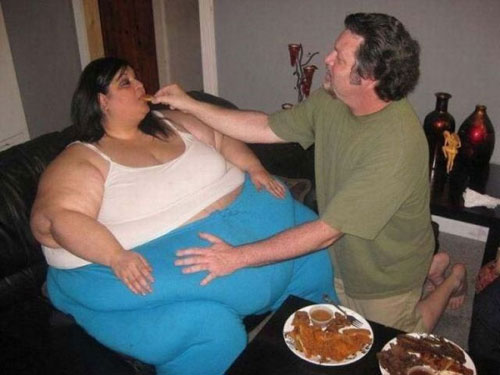
When people gain weight, feeling sexy is rarely cited. However, for those in the feedist community, the opposite is true—overeating and weight gain is the ultimate aphrodisiac. The gaining fetish (which goes by many names and all of which will be referenced) is a subcategory of fat fetishism—a strong, potentially exclusive sexual attraction to overweight people. Within the feederism fetish, one partner (typically male) derives erotic enjoyment from feeding food to their partner to gain weight. The “feedie” enjoys being fed and gaining weight, sometimes to a state of immobility.
Dr. Jenni Skyler, sexologist and licensed marriage and family therapist for AdamEve.com, has had experience with those who practice the fetish and explains “encouragers” (vernacular typically used for gay men) or “feeders” (who are typically straight men), enjoy piloting caloric intake. To them, changing the human body is the ultimate kink. “They like the aspect of actually feeding their partner as the combination of food and sex is highly erotic for many people,” she explains. “Conversely, many feeders report feeling aroused by someone who appreciates their obesity and continual weight gain. They also enjoy being fully taken care of.”

For many in these communities, the duality of power and humiliation is also an erotic turn on. A study from 2009 concluded that “fat admirers” find overweight people attractive because they purposely reject sociocultural norms of attractiveness. Even emaciated figures were rated higher among these men.
Feederism is similar to BDSM, as the feeder/feedee relationship is a dominant and submissive bond. One takes charge, the other takes orders. The online community surrounding feederism is active and tightly knit. Many frequent sites like Fantasy Feeder to share recipes, experiences and discuss the healthiest ways to get fat fast.
Many believe the feeding fetish was founded by gay men, courtesy of the “Girth and Mirth” movement in the ‘70s, when a sizable network of social groups formed to promote positive attitudes toward larger bodies in the community. In 1996, the first website dedicated to gay men into weight gain launched, introducing the heterosexual community to the fetish. It’s been rapidly growing ever since.
In 2013, an anonymous writer detailed insightful experiences with the feederism fetish in an article titled, I Have a Sexual Fetish For Being Fed and Gaining Weight. “I love eating very caloric, rich foods, and I practically squeal with glee if I see the numbers on the scale climb,” she writes. “I like being called piggy, requested to oink and being accused of being gluttonous and lazy.” To her, the fetish has made being fat something to celebrate instead of something to hate herself for. Jennifer, a 36-year-old feedee, has gained 100 pounds since launching her pay site, NSFW, in 2011.
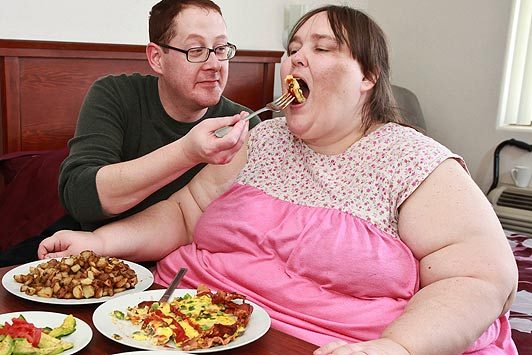
As is true of most fetishes, communication is important when engaging. Being able to discern reality from fantasy and understanding that consent needs to be continually discussed and negotiated is paramount. Some in the community try to manipulate the feedees, of course, pressuring them into doing things they aren’t comfortable with. Some will even pick on their insecurities to get it done. But as long as the rules of this controversial lifestyle/identity/sexual orientation (feedism has been described as all three) are mutually agreed on and the risks are understood, the feed is on. Bon appetit.
- Details
- Written by Patrycja Jadczak
- Category: Obesity
- Hits: 1431
Obesity may impact your social and sexual life
Obesity is often associated with laziness and a sedentary lifestyle, which may often percolate into sex lives as well. In men, it also significantly decreases the time they can maintain an erection.
Men who are obese tend to have lower levels of testosterone -- the male sex hormone -- that helps in development of male sexual organs and strong bones. The reduced levels of this hormone may at times lead to erectile dysfunction.
"Obesity is directly linked to hormonal imbalance and lower testosterone levels, which, in turn, can inhibit sexual desire in men," Tarun Mittal, Consultant Surgeon (Laparoscopic and Bariatric Surgery), Sir Ganga Ram Hospital, told IANS.
"The increased body fat leads to more sex hormone binding globulins (SHBG) in the system. SHBG is a natural chemical that binds to testosterone, which means that there is less of the sex hormone left to handle the demands of a normal sex life," Mittal added.
Also, obesity increases the risk of developing a number of serious health conditions, including coronary heart disease, high blood pressure, stroke, Type 2 diabetes, cancer, sleep apnea, gallstones, other heart disease and various types of cancer.
"Obesity can lead to heart problems, breathing difficulties, joint problems and sudden cardiac death," Ashish Bhanot, Chief Bariatric Surgeon, Apollo Spectra Hospitals, New Delhi, told IANS.
"With a high risk of diabetes and high blood pressure, obesity may also take an emotional toll, as some may experience depression, feelings of social isolation, discrimination and an overall lower quality of life," Bhanot added.
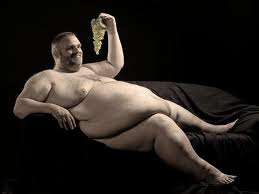
Further, apart from the physical intimacy, obesity may also affect the social life, as overweight or obese people are more prone to being bullied, humiliated or ostracised. They are also more likely to engage in bullying behaviour.
The fear of bullying may also lead them to exercise less and stay indoors.
Obesity is directly related to presence of excess fat in the body. Sedentary lifestyle, lack of physical activity, excess consumption of sugars and carbohydrates and lack of exercise are the main causes of the increasing numbers of obesity cases.
However, only a limited number of cases are due primarily to genetics, medical reasons, or psychiatric illness.
"Obesity creates a negative self-image. An individual feels demotivated and there's lack of self-confidence. Such people are unable to accept their weight and their size can leave them sleeping single in a double bed," Deep Goel, Director (Department of Bariatrics) and Gastrointestinal Onco Surgeon, BLK Super Speciality Hospital, told IANS.
Successful weight-loss treatments can help in fighting obesity. This may include making dietary and lifestyle changes, such as eating fewer calories and getting involved in physical activities.
Surgeries through laparoscopic or robotic approach are also performed for weight loss. Obesity surgery works by helping to reduce the number of calories that are available in your body. Surgery is the only available method for morbidly obese patients.
Bariatric surgery is recommended for people with a BMI of 40 or more or if they have a serious health problem related to their obesity. Bariatric surgery also helps in reducing 70-80 per cent of excess within 6-9 months.

Most of the experts say that the natural way of reducing obesity is by controlling the diet and exercising.
"The best way to overcome obesity is by making certain positive lifestyle changes, exercising and adopting a proper fat-loss diet. A healthy lifestyle eventually helps to overcome diseases and enhances the quality of life," Rachit Dua, a Delhi-based advanced certified fitness coach and nutritionist, told IANS.
"Saturated fats do not make you fat, excess of sugar and carbohydrate does. So it is generally advised to strictly stay away from sugars and trans fats. Also, do not over-exert your body with exercise, gradually increase the intensity," Dua suggested.
Page 6 of 8
